:quality(80)/business-review.eu/wp-content/uploads/2022/02/foto-main-story-deschidere-articol-2.jpg)
Automotive. Car-sharing. Technology. Real estate. Retail. What do all these sectors have in common? According to pundits, they will be Romania’s star sectors this year. And since they are also some of the biggest employers on the local market, Business Review sat down with several company representatives and HR specialists, who helped us predict this year’s most important developments on the local labour market and understand what companies should do to ensure personnel retention, as employees are reviewing their work-life balance these days, being most interested in flexible work models.
By Anda Sebesi
Car sharing is on a roll
Last year, the local car market operated under major pressures generated by both the pandemic and the global semiconductor crisis. In mid-2021 the latter crisis deepened even further, forcing car makers to constantly adjust their output as they were confronted with a series of component shortages. And even though they tried to optimise deliveries for existing orders, delivery time for cars varied between three months to a year.
But despite all the struggles of the global automotive sector, the personal car will remain the top choice when it comes to mobility in the European Union, according to the 2021 Digital Auto Report released by PwC’s global strategy department last year.
“Consumers are more and more preocupied with their health and safety and will continue to use their personal cars after the pandemic extinguishes. According to ACEA, despite the semiconductor crisis, the EU market posted an increase of over 11 percent during January-August 2021 compared to the similar period of 2020. Romania aligns with this trend, with a 7 percent increase in the same period, with the advance largely being generated by the Rabla programme,” said Daniel Anghel, Partner and Leader for the automotive industry within PwC Romania.
The 2021 Digital Auto Report also shows that in light of the changes generated by the pandemic, European rolling stock will stagnate by 2035 to 281 million vehicles, after the previous edition of the report had predicted a decrease of 1.2 percent. Meanwhile, alternatives to the personal car such as car sharing and rent-a-car platforms will post the highest advance in the future, says the same report, which notes that the market share of alternative mobility solutions will reach 10 percent in 2025 and 21 percent in 2035, while the usage of personal cars will drop from 92 percent in 2021 to 87 percent in 2025 and 72 percent in 2035.
“Bolt represents the new urban mobility and micromobility, which in itself is a rather recent trend that has been growing constantly over the past years,” says Cristian Salceanu, Country Manager at Bolt Romania.
He adds that as of last year, the company became market leader in Romania, operating in over 20 cities, many of which are getting the company’s full portfolio of services, from ride hailing to scooter renting and food delivery.
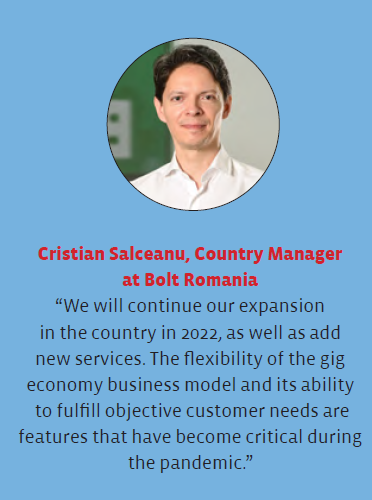
“We will continue our expansion in the country in 2022, as well as add new services that will leverage our platform further. The flexibility of the gig economy business model and its ability to fulfill objective customer needs are features that have become critical during the pandemic, and they will continue to fuel our growth,” he says. Salceanu adds that since it’s part of a young industry, Bolt Romania keeps in close contact with authorities in all the cities where it operates, assisting them in setting up the proper legal framework to allow its services to benefit both its partner drivers as well as its riders and customers.
“Bolt’s mission is to build cities for people, not cars, and to provide more environmentally-friendly alternatives for mobility—be it scooters, electric vehicles or other shared services. Leveraging the experience we have accummulated in over 20 cities all around the country—and in more than 40 other countries across Europe and Africa—will hopefully put us in an even better position in the future, as a solid partner for urban mobility,” Salceanu concludes.
Real estate is adapting to the new paradigm
It’s becoming increasingly clear that companies won’t give up on their physical offices, because employee engagement, organisational culture, creativity, and motivation thrive on physical presence. Most of them are expecting a massive return to the office during the second quarter of this year, so they have already started to remodel their spaces and have adopted a hybrid work model.
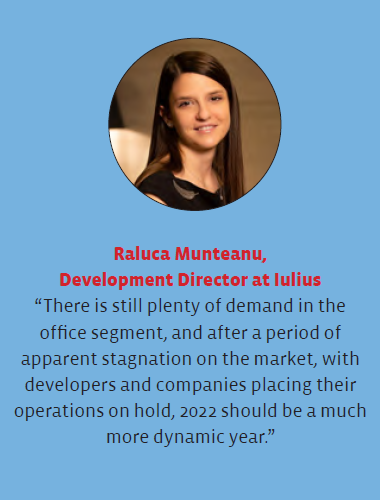
“There is still plenty of demand in the office segment, and after a period of apparent stagnation on the market, with developers and companies placing their operations on hold, 2022 should be a much more dynamic year. Since the end of 2021, we’ve seen a reactivation of development plans from companies in our premium office space portfolio, and we believe this tendency will grow stronger this year,” says Raluca Munteanu, Development Director at Iulius. The company operates in Iasi, Timisoara, and Cluj-Napoca, cities that are known for attracting young talent for software development, research, and technology centres. “The health crisis has been a driver of growth for some businesses in these areas, amid increasing digitalization in multiple sectors, including government and healthcare. As a result, the workload has been much higher and hundreds of jobs have been created,” she adds.
In Munteanu’s view, another trend impacting office space demand is the automobile industry’s shift of focus towards electric models, autonomous driving, increased user safety, as well as a diversification of car features and functions, which has led to the emergence of new companies across Europe, including in Romanian cities with a tradition in automotive development and research.
“For Immofinanz Romania, it will be an intense period in the office segment, as we are preparing to launch myhive flexible offices as well as to continue expanding the implementation of the myhive concept in our office portfolio,” says Fulga Dinu, Country Manager for Operations at Immofinanz Romania.
Having anticipated the hybrid work trend even before the pandemic, Immofinanz started to work on a complimentary business module that would provide flexible and tailor-made office solutions and an overall upgraded office experience. “The new myhive concept is the most flexible so far and it offers tailored solutions to tenants who are facing increasingly dynamic circumstances. This new component, based on complete flexibility, brings an upgrade and an extremely varied range of options to customers, in order to accommodate almost any need. Tenants can sign long-term or short-term contracts, benefit from all-inclusive rental services, relocate within the myhive portfolio or expand/contract their leased premises on a monthly basis,” says Dinu. The myhive flexible offices concept will be inaugurated in the myhive S-Park building in March 2022. At the end of this year, the company will also open the myhive Victoria Park building, now undergoing a refurbishment process.
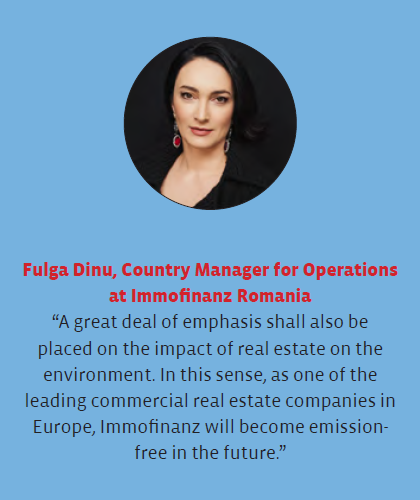
“On a positive note, but still maintaining caution and objectivity due to the potential evolution of the pandemic, we are carrying on with business as usual and hoping for higher office attendance in 2022,” says Antoniu Panait, Managing Director at Vastint Romania. 2022 started out great for the company, as it received the “Leading Green Development and Developer of 2021” title for Business Garden Bucharest, an award that confirms this project’s state-of-the-art technical details and recognises Vastint’s efforts to introduce a standard to which everyone else on the market can relate, making it easier to prove to tenants that its offices are safe places to carry out their work.
Asked about the challenges faced by the local real estate sector this year, Raluca Munteanu of Iulius says that the top challenge for most areas of real estate will be adapting to the new paradigm of social behaviour. Even before the pandemic, things were shifting towards better quality of life, connecting with nature, and dedicating more time to personal experiences, but all of these tendencies became even stronger in this new reality, which forced us to pause and regroup.
“Since alignment with the new demands must be as fast as possible, we believe that projects that anticipated this direction, such as urban regeneration projects that strongly connected to community life and played a role in the development of cities, have a competitive advantage. And while adaptation has been the central principle in the real estate business over these past two years, we’re now seeing a shift towards proactivity, anticipation, and vision, all with a focus on social experience,” she says.
In addition, a mix of fluctuating factors like the health and energy crises, inflation, rising prices for building materials, supply chain and logistics issues, etc., will continue to generate a major pressure, and the variables here are innumerable in terms of the challenges they pose and the strategies companies can employ to deal with these challenges.
Last but not least, in the Iulius representative’s view, ESG (Environmental, Social, and Governance) policies will be playing an extremely important role, gaining traction across the board, and they will count in financing, partnerships and business relationships, as well as in the consumer experience. “ESG criteria are driving developers to more responsibly evaluate any future investment in terms of its relationship with nature and how it can cultivate a socially healthy environment, while also paying more attention to the organisational structures. All these elements ensure that the non-financial impact of an investment is more sustainable. Ultimately, all of this has to do with a healthier and safer way of life, today and in the future,” Munteanu argues.
Along similar lines, Dinu of Immofinanz thinks that the most significant challenges of the near future will be highlighting the benefits of social interaction and environmental awareness. “A great deal of emphasis shall also be placed on the impact of real estate on the environment. In this sense, as one of the leading commercial real estate companies in Europe, Immofinanz will become emission-free in the future. As an immediate step towards this goal, we will commence the refurbishment of Bucharest Financial Plaza by transforming it into a high-quality and green myhive building with a gold sustainability certification,” Dinu says.
Meanwhile, Panait of Vastint talks about the challenges of the local real estate market from a psychological perspective, given the negative impact that the pandemic has been having on all of society. “Recent research into new working arrangements, especially looking at the effects of working from home, has found greater emotional exhaustion and cognitive stress associated with reduced social support from colleagues,” Panait notes. He adds that the quality of relationships, whether professional or personal, has also decreased. Furthermore, the concept of mentorship has been devalued within teams, often leading to a decrease in productivity, which in turn resulted in a low quality of life and caused difficulties with professional adjustment for some employees.
Additionally, the rise of the construction materials prices, as well as workforce disponibility and costs, are very important issues for developers who will have projects on going in the coming period. Many parts of the market are still volatile and this affects business decisions in the short and medium term, considering the fact that there’s been no increase in terms of rents and revenues,” Panait adds.

As for the most dynamic segment of the local real estate sector, Raluca Munteanu says that whether it’s a mixed-use, office, retail or residential project, as long as it meets realistic expectations in terms of location, amenities, facilities, finishes, and nearby opportunities, if it has nature inserts, is built in a sustainable manner, and makes our lives easier and safer, then the market will support it. “In our field, we choose to focus on two categories of developments. We believe that experience, entertainment, and diversity oriented regional projects will see continued growth, and so will retail parks, which are set to become champions in terms of efficiency, as they provide convenience. However, projects that fall somewhere between these categories will suffer due to their failure to provide relevant services for increasingly demanding consumers,” she explains.
“Generally, real estate will be required to focus on people’s needs more than it has done in the past; in other words, it will have to provide safe, cozy, flexible, and enjoyable office spaces or, if we’re talking about retail, an outstanding 360-degree shopping experience that should also factor in the leisure and family components,” Fulga Dinu adds.
Speeding up digitalization and sustainability
Technology has seen accelerated progress, especially in the pandemic context, which is bridging all the gaps to a more digitalized world. “Over the past couple of years, it’s been essential for us to consolidate and enhance our financial strength as well as ensure good market coverage and substantial sales volumes, in order successfully navigate through all the temporary production shortages and logistics challenges while still capturing growth,” says Bogdan Constantinescu, Managing Director at ASBIS Romania.
He says that on the business side, there’s been a clear acceleration of the digitalization process, while online migration has literally brought the world closer together. “Collaboration solutions that are bringing people from all over the country or the world together have become part of the new normal. We therefore expect videoconferencing equipment to be present in most companies and most offices.”
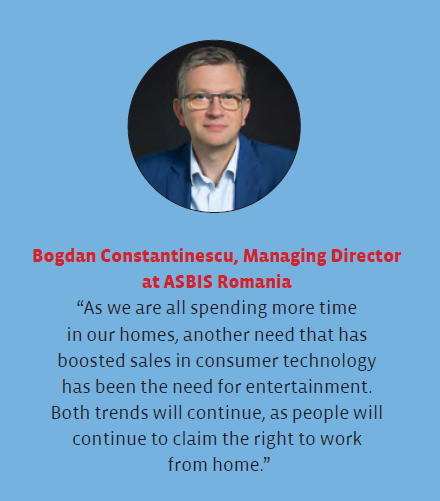
Elsewhere, in the consumer segment, we have seen a considerable rise in demand for equipment that enables people to work and/or study from home. “As we are all spending more time in our homes, another need that has boosted sales in consumer technology has been the need for entertainment. Both trends will continue, as people will continue to claim the right to work from home, at least partially, having experienced the benefits of this practice,” Constantinescu says. He adds that the public sector has also been making quick progress in the area of digitalization. “I believe the process should continue there. Government institutions and authorities have had to operate and communicate with each other and with the private sector in an online environment, and that situation has created new workflows and new procedures and has required more IT equipment and support.
In turn, Lucian Enaru, Country General Manager at Schneider Electric, says that one of the few positive outcomes of the pandemic has been the unprecedented technological advancement within a remarkably short period of time. “The new circumstances have taken the need for automation and energy efficiency higher on the public agenda as well as on the business agenda. Accelerating automation is what will drive the future of industrial business and supply chain. Automation-centric technology and solutions can deliver greater efficiency and sustainability. As a result, our technologies and solutions have become very sought after, and this is a trend that will continue in 2022.”
Since a sustainable future requires sustainable energy, organisations are becoming more and more aware of the need to keep a tight grip on their energy consumption. They are also more actively seeking flexible, scalable, greener, and safer solutions for their buildings, as we have all seen lately that the future can bring unexpected events for which we need to be prepared. “Schneider Electric Romania is ready to support them with a variety of solutions, from micro data centres to complex electric infrastructure, and from automation solutions to power supply solutions. We also believe that energy management is key in improving sustainability,” Enaru adds.

Retail seeing fiercer competition in 2022
According to Tiberiu Danetiu, Marketing Director at Auchan Romania, 2022 will be a year of developments on the retail market, with new players emerging, especially in the quick commerce segment, which will lead to even stronger competition. Growth and expansion is expected as well, particularly in the proximity, online, and express delivery services segments.
“At the same time, it will be a difficult year, with quite a lot of turbulence, given the inflationary context which has a direct impact on Romanians’ purchasing power, and that overlaps with the health crisis we have been experiencing for two years now. Prevention measures are still limiting people’s access to shopping centres, severely affecting retailers in department stores, where most local producers are listed,” Danetiu notes. As for the company’s plans for 2022, he says that it will continue development on the proximity segment, both through its nationwide partnership with OMV Petrom as well as through a new large supermarket format. “In addition, we will take our commercial project to a new level to better adapt to local premises and to the needs and expectations of our customers. We’ll also expand the company’s digital transformation, as well as continue to simplify the buying process both online and in-store, to create a great customer experience.”
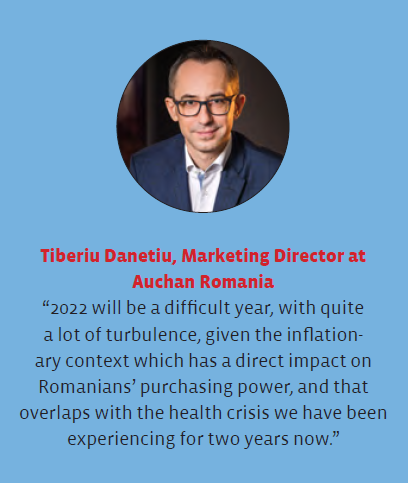
For his part, Metro Romania CEO Adrian Ariciu says that that digitalization and e-commerce will remain top targets in 2022, as these are essential strategic approaches to meeting consumers’ needs and improving their experiences, but these will only be able to evolve alongside optimised and streamlined logistics. “Another trend in retail will be the adoption of circular economy principles,” he notes.
Economically, we are facing an increase in food prices, with the cost of the average shopping cart likely to rise by up to 10 percent in the coming months. In the production cost structure, this translates to an impact that’s already being felt in logistics, transport, wage increases, auxiliary materials, packaging or non-food products. “The main challenge for the retail sector may come from potential consumption shocks following the decline in consumers’ financial resources. As a result of price increases, consumers will look for the cheapest products in each category,” Ariciu predicts.
This year, Metro Romania will focus on the expansion of the LaDoiPasi franchise, which currently has 1,698 stores nationwide. “Our goal is to reach 2,000 stores by 2023 and maintain our position as the largest network of independent stores in Romania. The company will continue its digital transformation in order to improve internal processes, as well as develop a digital ecosystem for its professional customers and its innovations on the assortment line. “Moreover, we will invest in implementing projects based on renewable energy and carbon footprint reduction. For example, we plan to install a photovoltaic plant on the Metro Baneasa store building that will allow us to produce green energy. This pilot project will reduce our consumption of fossil fuel-based energy by 15-20 percent,” Ariciu explains.
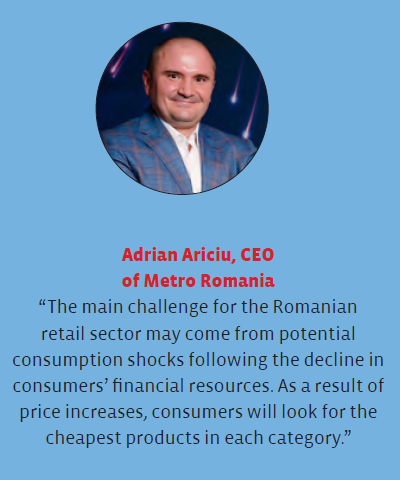
HR: 2022 could be a productive year
Looking at the Romanian talent landscape in 2022, Madalina Racovitan, Tax Partner and Head of People Services at KPMG in Romania, says that there are several factors that will continue to have a major influence on companies’ priorities. “These are related to the exponential evolution of technology, which is impacting all industries and functions and generating an overhaul of processes, working practices, and occupations. Remote working has generated a different set of behaviours and mindsets, and meanwhile we’re also seeing the rise of the GenZ workers, who have different expectations from their workplaces, their careers, and their leaders,” she says.
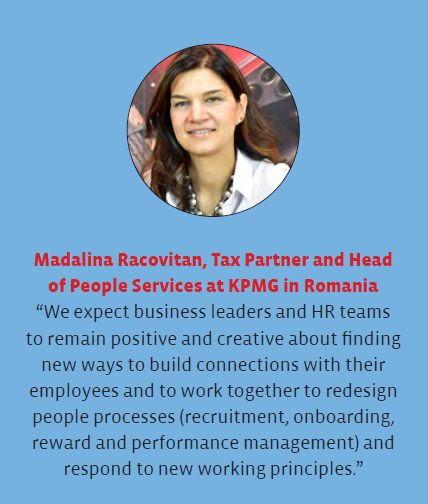
Meanwhile, Florin Godean, Country Manager at Adecco Romania, says that this year is going to be marked by a lot of uncertainty in terms of both the labour market as well as the wider economic conditions. “A phenomenon that will continue in 2022 is the low unemployment rate and the workforce shortage in certain industries such as manufacturing, hospitality, transportation or logistics. In addition, more and more companies will start focusing their employee retention efforts on developing a benefit package that includes flexibility in the work schedule, wellbeing, and remote work.”
The pandemic has its ups and downs, and the associated regulations and restrictions will continue to influence the labour market. “There are hopes that 2022 will be the year when things finally settle down, allowing all industries to recover and start anew. However, the workforce crisis is something that we will be experiencing this year as well. Things that could deepen the crisis even further would be people migrating to other EU states in search of higher salaries or new restrictions on mobility to limit pandemic waves,” Godean adds.
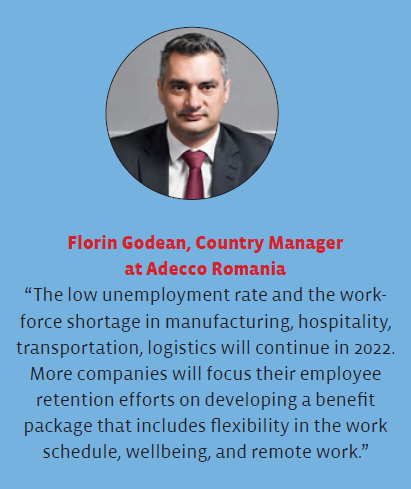
Raluca Stefanescu, Social Media Recruitment Marketer at Dora Happy Recruiter, says that 2022 could be a very productive year for companies that are able to adapt to the market dynamics. “Companies that will find the right solutions for their difficulties in 2022, as well as companies that will quickly learn how to use available technologies, will be able to make this year a success. But like in any period of transition, some companies won’t be able to keep up and they will likely have a very challenging year.”

One thing is for sure: employees will continue to expect flexibility in all forms, from workspaces to delivery hours and available tools. Plus, behavioural changes have also given way to some new attitudes regarding work-life balance, and people have started to rethink their personal and family habits, priorities, and career aspirations. As a result, we might see a higher number of people planning to make a complete career shift. “Employees’ demands will have to do with more than just a paycheck, and they’ll be looking for a strong purpose, clear strategy, and meaningful employee experience,” Racovitan thinks.
According to Sorina Donisa, the CEO of APT, companies will invest more in training and development programmes for their employees, helping them complete their skillsets. “Hybrid work will become a normality as it is preferred by the majority of candidates and employees. We will therefore witness a high turnover of personnel, magnified by the fact that it is now easier for candidates to make a career change, leveraging the hybrid work model,” Donisa argues. She adds that 2022 will be the year when we will see the emerge of a new market for products designed to increase employee engagement and measure the performance of those working from home. “Now, more than ever, companies have the opportunity to promote their employer brand by investing in wellbeing or personal and professional development programmes. This will lead to a growth of the training and organisational development consultancy market.” Donisa also notes that companies should be aware of the fact that salaries payments are going up right now, so they should consider diversifying their benefits package to respond to higher workforce demands, the development of online services that require technical skills, and the rising inflation.
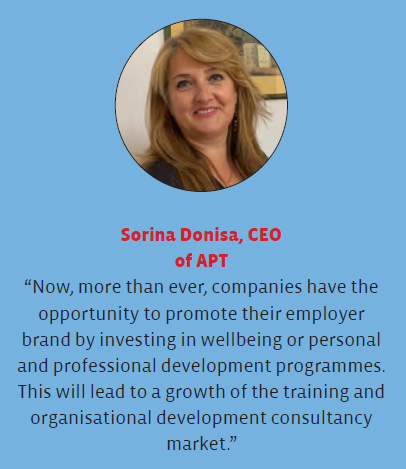
Last but not least, companies will need to actively listen to employees’ voices and make sure that communication channels are open at both ends. “We expect business leaders and HR teams to remain positive and creative about finding new ways to build connections with their employees and to work together to redesign people processes (recruitment, onboarding, reward and performance management) and respond to new working principles,” Racovitan of KPMG concludes.
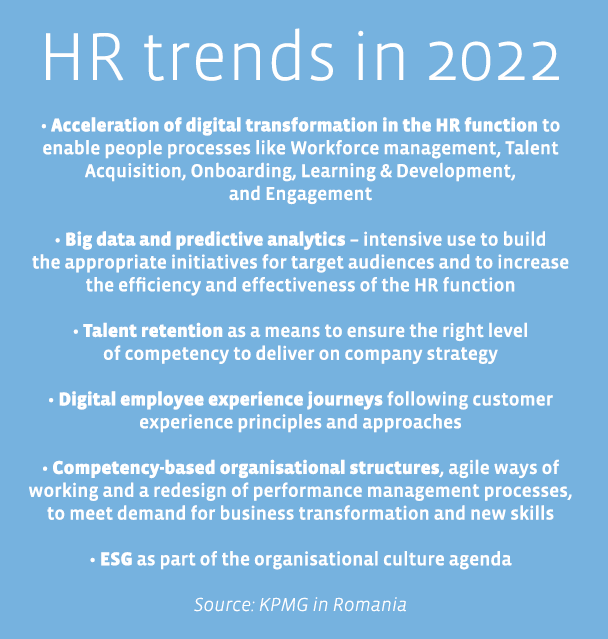
Photo: dreamstime.com



:quality(80)/business-review.eu/wp-content/uploads/2024/07/SNIPPETS-REALTY-2024_PANAIT.png)



:quality(80)/business-review.eu/wp-content/uploads/2024/06/22C0420_006.jpg)

:quality(80)/business-review.eu/wp-content/uploads/2024/06/COVER-1-4.jpg)



:quality(50)/business-review.eu/wp-content/uploads/2024/06/Adrian-Ariciu-2.png)
:quality(50)/business-review.eu/wp-content/uploads/2023/12/panait-25.jpg)
:quality(50)/business-review.eu/wp-content/uploads/2024/05/MicrosoftTeams-image-67.png)
:quality(80)/business-review.eu/wp-content/uploads/2024/06/br-june-2.jpg)
:quality(50)/business-review.eu/wp-content/uploads/2024/07/VGP-Park-Timisoara_-8thbuilding_iulie-24.jpg)
:quality(50)/business-review.eu/wp-content/uploads/2024/07/America-House-Offices-Bucharest-Fortim-Trusted-Advisors.jpg)
:quality(50)/business-review.eu/wp-content/uploads/2024/07/BeFunky-collage-33-scaled.jpg)